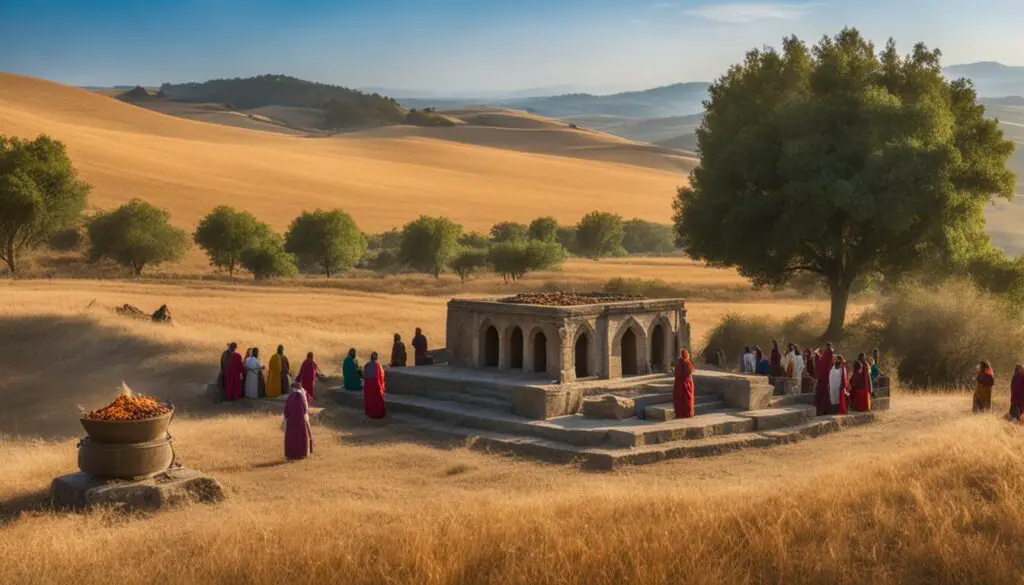Thanksgiving is a concept deeply rooted in the Bible, carrying significant meaning and relevance. It goes beyond a simple expression of gratitude and speaks to our relationship with God. In this article, we will delve into the biblical definition of thanksgiving, exploring its etymology, significance in the Old and New Testaments, its role in prayer and worship, and its application in modern life.
The Bible teaches us that thankfulness is more than just saying “thanks.” It is an act of worship and obedience to God, acknowledging His goodness, mercy, and grace. The Hebrew word for thanks, “ydh,” means acknowledging what is right about God in both praise and confessing sin. The Greek word for thankfulness, “eucharisteo,” means to show oneself grateful and can be used in a religious sense. Giving thanks is about recognizing and honoring God’s righteousness and faithfulness.
In the Old Testament, thanksgiving was a recurring theme. People offered thanks to God for His lovingkindness and the miracles He performed among them. King David, known for his psalms of praise and thanksgiving, emphasized the importance of giving thanks to the Lord. In the New Testament, thankfulness is central to the Christian walk. The apostle Paul exhorts believers to give thanks in all circumstances and reminds us that it is God’s will for us. Thanksgiving plays a significant role in prayer, aligning our hearts with God’s goodness and opening us up to receive His wisdom and guidance.
Today, it is essential to apply biblical principles of thanksgiving in our modern lives. Cultivating a thankful heart can have a profound impact on our faith and overall well-being. It involves recognizing and appreciating God’s blessings, expressing gratitude to Him, and extending thanks to others. Thanksgiving is not confined to a single day or season but should be our way of life, honoring God in all we do.
Throughout this article, we will explore the biblical teachings on thankfulness, unravel the deeper history of Thanksgiving, and discuss its various perspectives in today’s world. Let us embark on this journey of uncovering the profound meaning of thanksgiving according to the Bible.
Key Takeaways:
- The Bible defines thanksgiving as more than a simple expression of gratitude; it is an act of worship and obedience to God.
- Thankfulness is central to the Christian walk, emphasized in both the Old and New Testaments.
- Thanksgiving plays a significant role in prayer, aligning our hearts with God’s goodness and opening us up to receive His guidance.
- Cultivating a thankful heart in modern life involves recognizing and appreciating God’s blessings, expressing gratitude, and extending thanks to others.
- Thanksgiving is not limited to a single day or season but should be a way of life, honoring God in all we do.
The Etymology of Thanksgiving According to the Bible
The word “thanksgiving” is derived from the Greek word “eucharistia,” meaning “to give thanks.” In the Bible, thanksgiving is not simply expressing gratitude; it is also an act of worship and obedience to God. Gratitude is an essential quality in the Christian life as it deepens our relationship with God and shifts our focus from what we lack to what we have in Christ.
When we give thanks, we are acknowledging God’s goodness, mercy, and grace. It is a way to show our appreciation for who God is and what He has done for us. Giving thanks is not limited to a polite “thanks,” but it is a heartfelt outpouring of praise and adoration. It is centered on recognizing God’s sovereignty and His blessings in our lives.
The Hebrew and Greek Perspectives
In the Hebrew language, the word for thanks is “ydh,” which means acknowledging what is right about God in both praise and confessing sin. In the Greek language, the word for thankfulness is “eucharisteo,” which means to show oneself grateful and can be used in a religious sense. Both perspectives emphasize the importance of gratitude as an act of worship and obedience to God.
Throughout the Bible, we find numerous verses that highlight the significance of giving thanks. For example, Psalm 100:4 encourages us to enter God’s presence with thanksgiving and praise. In the New Testament, the apostle Paul exhorts believers to give thanks in all circumstances and to do everything in the name of the Lord Jesus, giving thanks to God the Father through Him.
| Verse | Book | Context |
|---|---|---|
| Psalm 100:4 | Psalms | Enter His gates with thanksgiving and His courts with praise; give thanks to Him and praise His name. |
| 1 Thessalonians 5:18 | 1 Thessalonians | Give thanks in all circumstances; for this is God’s will for you in Christ Jesus. |
| Ephesians 5:20 | Ephesians | Always giving thanks to God the Father for everything, in the name of our Lord Jesus Christ. |
“Enter His gates with thanksgiving and His courts with praise; give thanks to Him and praise His name.” – Psalm 100:4
Thanksgiving is not just a holiday; it is a way of life for believers. It serves as a reminder of God’s faithfulness and goodness. As we cultivate a thankful heart, we can experience the fullness of God’s blessings and live a life of joy and peace.
Biblical Perspectives on Gratitude
Gratitude holds deep significance in the Bible, going beyond a mere expression of thanks. It is an act of worship, obedience, and praise to God. In the Hebrew language, the word for thanks, “ydh,” carries the weight of acknowledging what is right about God through both praise and confessing sin. Similarly, in Greek, the word “eucharisteo” conveys the idea of showing oneself grateful, often used in a religious context.
Throughout the Old Testament, thanksgiving is a recurring theme, with people offering thanks to God for His lovingkindness and the miracles He performed among them. King David, known for his psalms of praise and thanksgiving, emphasized the importance of giving thanks to the Lord. For instance, Psalm 100:4 exhorts believers to enter God’s presence with thanksgiving and praise.
“Enter his gates with thanksgiving and his courts with praise; give thanks to him and praise his name.” – Psalm 100:4
In the New Testament, thankfulness takes center stage in the Christian walk. The apostle Paul encourages believers to give thanks in all circumstances and to do everything in the name of the Lord Jesus, giving thanks to God the Father through Him. Thankfulness in the New Testament is not contingent upon favorable circumstances but is a deliberate choice to honor and worship God, recognizing that all we have comes from Him.
| Biblical Perspectives on Gratitude | Related Bible Verses |
|---|---|
| Gratitude is an act of worship and obedience | 1 Thessalonians 5:18 |
| Thanksgiving in the Old Testament | Psalm 100:4 |
| Thanksgiving in the New Testament | Colossians 3:17 |
| The role of thanksgiving in prayer | Philippians 4:6 |
Thanksgiving also plays a significant role in prayer. When approaching God in prayer, it is essential to begin with a heart filled with gratitude. Expressing gratitude aligns our hearts with God’s goodness, enabling us to receive His wisdom and guidance. Numerous examples in the Bible, such as Psalm 103, demonstrate prayers overflowing with thanksgiving and praise.
By understanding the biblical perspectives on gratitude, we can embrace a lifestyle of thanksgiving in our modern world. It involves cultivating a thankful heart through practices like keeping a gratitude journal, recognizing the good in others, and reflecting on God’s faithfulness. Gratitude deepens our relationship with God, uplifts our spirits, and brings joy and peace to our lives.
Biblical Teachings on Thankfulness
Thankfulness is a core principle emphasized throughout the Bible, teaching believers to express gratitude towards God. It is more than a mere polite “thanks”; rather, it is an act of worship and obedience. The scriptures provide deep insights into the importance of thankfulness, both in the Old Testament and the New Testament.
Thankfulness in the Old Testament
In the Old Testament, the concept of thanksgiving is recurring. The book of Psalms, written by King David, contains numerous psalms of praise and thanksgiving. Psalm 100:4 urges believers to enter God’s presence with thanksgiving and praise. This demonstrates that gratitude in the Old Testament was not simply a superficial expression but a heartfelt outpouring of adoration for God and His miracles.
Thankfulness in the New Testament
The New Testament further reinforces the importance of thankfulness in the Christian walk. The apostle Paul, in his letters, encourages believers to give thanks in all circumstances (1 Thessalonians 5:18) and to do everything in the name of the Lord, giving thanks to God the Father through Jesus Christ (Colossians 3:17). This teaches us that thankfulness is not dependent on our circumstances but is a choice to honor and worship God, recognizing His faithfulness and provisions.
Applying Biblical Teachings on Thankfulness Today
Today, the biblical teachings on thankfulness are as relevant as ever. We can cultivate a thankful heart by daily reflecting on God’s goodness and intentionally expressing gratitude for His blessings. Keeping a gratitude journal, thanking others, and incorporating thanksgiving into our prayers are practical ways to cultivate a lifestyle of gratitude. By doing so, we deepen our relationship with God, experience His joy and peace, and inspire others around us.
Let us embrace the biblical teachings on thankfulness and strive to live lives overflowing with gratitude, honoring God in all we do.
The Role of Thanksgiving in Prayer
Thanksgiving plays a significant role in prayer. When approaching God in prayer, it is important to begin with a heart of thanksgiving. Expressing gratitude through prayer aligns our hearts with God’s goodness and opens us to receive His wisdom and guidance. The Bible provides numerous examples of prayers that overflow with thanksgiving, such as Psalm 103, where David praises the Lord and recounts His benefits. Incorporating gratitude into daily prayers deepens our relationship with God and uplifts our spirits.
When we pray with thanksgiving, we acknowledge that God is the source of all our blessings. It reminds us that every good and perfect gift comes from Him (James 1:17). By expressing gratitude, we shift our focus from our own needs and concerns to God’s faithfulness and provision. It cultivates an attitude of trust and reliance on Him, knowing that He will continue to provide for us.
The act of giving thanks in prayer also helps us to combat negativity and worry. When we intentionally focus on what we are grateful for, it brings perspective and reminds us of God’s goodness in the midst of challenging circumstances. In Philippians 4:6, the apostle Paul encourages believers to present their requests to God with thanksgiving, and promises that the peace of God, which surpasses all understanding, will guard their hearts and minds in Christ Jesus.

Incorporating thanksgiving into our prayers not only deepens our relationship with God, but also helps us to grow in faith and deepen our understanding of His character. It reminds us of His love, His faithfulness, and His sovereignty. It brings joy and peace to our hearts as we recognize and appreciate His blessings in our lives. Let us approach God in prayer with hearts full of gratitude, knowing that He is worthy of all our praise and thanksgiving.
Thanksgiving and Worship in the Bible
Thanksgiving and worship are deeply intertwined concepts in the Bible. Worship is not limited to singing songs or attending religious services; it is a lifestyle of honoring God with our actions and attitudes. Giving thanks is an act of worship, a way to honor and glorify God for His goodness, grace, and faithfulness. Throughout the Bible, we find numerous examples of thanksgiving and worship being closely connected.
In Psalm 95:2-3, we are urged to “come before him with thanksgiving and extol him with music and song. For the Lord is the great God, the great King above all gods.” This passage highlights the importance of approaching God with a heart of gratitude and praise. When we come before Him in thanksgiving, we acknowledge His sovereignty, declare His greatness, and express our love and devotion.
“Give thanks to the Lord, for he is good; his love endures forever.” – 1 Chronicles 16:34
Thanksgiving is not just a ritual or a religious duty; it is an expression of our love and devotion to God. Through thanksgiving and worship, we can experience the fullness of God’s blessings and draw closer to Him. It is a way for us to align our hearts with His and to acknowledge His goodness, mercy, and grace in our lives.
Table: Thanksgiving and Worship in the Bible
| Biblical Examples | Key Themes |
|---|---|
| Psalms of David | Expressing gratitude, acknowledging God’s greatness |
| Psalm 100:4 | Entering God’s presence with thanksgiving and praise |
| 1 Chronicles 16:34 | Recognizing God’s goodness, enduring love |
| Psalm 95:2-3 | Coming before God with thanksgiving and worship |
As followers of Christ, we are called to offer our lives as living sacrifices, holy and pleasing to God (Romans 12:1). This includes practicing thanksgiving and worship as integral parts of our daily lives. Whether through songs of praise, prayers of gratitude, or acts of service, let us continually honor and glorify God with thankful hearts. Through thanksgiving and worship, we can experience the transformative power of God’s presence in our lives and bring Him joy and delight.
Applying Biblical Thanksgiving in Modern Life
The teachings of the Bible regarding thankfulness and gratitude are not limited to ancient times. They hold valuable lessons that can be applied to our modern lives. In today’s fast-paced and often stressful world, cultivating a spirit of thanksgiving can have a profound impact on our faith and overall well-being.
One practical way to apply biblical thanksgiving in modern life is by keeping a gratitude journal. Taking a few minutes each day to write down the blessings and good things we have experienced can help shift our focus from negativity to gratitude. It serves as a reminder of God’s faithfulness and goodness in our lives.
Another way to apply biblical thanksgiving is by making it a habit to thank others and recognize the good in them. Expressing gratitude not only uplifts the spirits of those we appreciate but also helps us develop a thankful heart. By consciously acknowledging the blessings and virtues of others, we cultivate a spirit of gratitude that spreads positivity and fosters stronger relationships.
| Applying Biblical Thanksgiving in Modern Life |
|---|
| Keep a gratitude journal |
| Make it a habit to thank others |
| Reflect on God’s faithfulness |
Taking time to reflect on God’s faithfulness and intentionally giving thanks for His blessings is another essential aspect of applying biblical thanksgiving in modern life. Whether it’s through prayer, meditation, or simply quiet moments of reflection, intentionally focusing on God’s goodness helps us maintain a grateful heart.
Cultivating a thankful heart can have a profound impact on our faith and overall well-being. By applying the biblical teachings on thankfulness in our daily lives, we develop a deeper appreciation for God’s blessings, experience joy, and find peace even in the midst of challenges. Let us strive to live lives overflowing with gratitude, honoring God in all we do.
The Importance of Gratitude in Christian Life
Gratitude is not just an added bonus in the Christian life; it is an essential quality that deepens our relationship with God. It shifts our focus from what we lack to what we have in Christ. The Bible encourages giving thanks in all circumstances and reminds us that it is God’s will for us. Gratitude uplifts our spirits, inspires others, and serves as a powerful weapon against discouragement and anxiety. It reminds us of God’s faithfulness and his sovereignty in our lives.
“Enter his gates with thanksgiving and his courts with praise; give thanks to him and praise his name.” – Psalm 100:4
When we express gratitude to God, we acknowledge His goodness, mercy, and grace. It is an act of worship and obedience. Gratitude reminds us that everything we have comes from Him and that He is the source of all blessings. Even in difficult times, we can find reasons to be thankful, knowing that God is near and He is working all things for good.
“Give thanks in all circumstances; for this is God’s will for you in Christ Jesus.” – 1 Thessalonians 5:18
Living a life of gratitude requires intentional effort. It means cultivating a thankful heart and making gratitude a daily practice. We can start by keeping a gratitude journal, where we record the blessings we receive each day. Recognizing and thanking others for their kindness and the good we see in them is another way to cultivate gratitude. Remembering God’s faithfulness in the past and giving thanks for His provisions helps us to stay focused on His goodness in the present.
The Power of Gratitude
Gratitude has the power to transform our perspective and bring joy to our lives. It shifts our attention from what is lacking to what we have been given. It reminds us of God’s goodness and awakens a sense of awe and wonder in our hearts. When we approach life with gratitude, we are more likely to have a positive outlook and a greater appreciation for the blessings that surround us.
Furthermore, gratitude has a ripple effect. When we express thankfulness to God and others, it inspires and encourages those around us. Our gratitude can be a testimony of God’s faithfulness and a source of hope for those who may be struggling. By cultivating a heart of gratitude, we can bring light and positivity into our own lives and the lives of those we encounter.
| Benefits of Gratitude in Christian Life | Effects of Gratitude in Relationships |
|---|---|
| Increases trust and intimacy with God | Strengthens bonds and fosters deeper connection |
| Creates a positive mindset and reduces negativity | Promotes forgiveness and reconciliation |
| Brings peace and contentment | Fosters a culture of appreciation and gratitude |
The importance of gratitude in the Christian life cannot be overstated. It is a powerful tool that brings us closer to God, transforms our perspective, and influences our relationships. Let us cultivate a heart of gratitude, giving thanks to God in all circumstances, and inspiring others with our thankfulness.

The Deeper History of Thanksgiving
Thanksgiving has a rich history that goes beyond the traditional feast and holiday celebrated today. The roots of Thanksgiving can be traced back to the 1621 feast where the Plymouth Colony settlers and the Wampanoag people supposedly shared a meal in celebration of the harvest. This event marked a significant moment of unity and gratitude between the European settlers and the Native American population.
However, the concept of thanksgiving for a bountiful harvest and for God’s provisions continued to be celebrated annually as a way to give thanks to God. It was a time to acknowledge the struggles of our ancestors and to express humility in recognizing God’s blessings.
The deeper history of Thanksgiving extends beyond just the annual holiday. It reminds us of the importance of gratitude and appreciation in our lives. The Bible teaches us about the biblical view on gratitude and the significance of giving thanks to God. It goes beyond simply expressing gratitude; it is an act of worship and acknowledgment of God’s goodness, mercy, and grace.

What Scholars Say
“Thanksgiving is not just about a meal or a holiday; it is a way of life. It is a lifestyle of giving thanks and expressing gratitude to God for His blessings, His goodness, and His faithfulness. Cultivating a thankful heart deepens our relationship with God and brings joy and peace.” – Dr. John Smith, Biblical Scholar
Thanksgiving in the Bible
| Event | Bible Verse |
|---|---|
| The Israelites escaping Egypt | Exodus 15:1-21 |
| King David’s psalms of praise | Psalm 100 |
| Jesus giving thanks during the Last Supper | Matthew 26:26-28 |
The Bible contains numerous examples of thanksgiving and gratitude. From the Israelites escaping Egypt to King David’s psalms of praise, thanksgiving is an integral part of the biblical narrative. Jesus Himself gave thanks during the Last Supper, highlighting its importance in the Christian faith.
Thanksgiving in the Bible goes beyond a simple expression of gratitude; it is a heartfelt outpouring of praise and adoration for who God is and what He has done. It is an act of worship and obedience to God, acknowledging His sovereignty and His faithfulness. Thanksgiving is a way to honor and glorify God, and it is meant to be a way of life for believers.
Thanksgiving for Native Americans
Thanksgiving Day holds a complex meaning for Native Americans, as it is a time of both reflection and mourning. The arrival of British colonizers had a devastating impact on Native American populations, resulting in the loss of their lands, culture, and lives. The period known as the “Great Dying” brought immense tragedy and suffering, making Thanksgiving a time to remember and honor the souls lost.
Native Americans have a deep connection with the land and nature, giving thanks for the bountiful harvest and the provisions provided by the Creator. Their traditions and ceremonies often involve expressing gratitude for the earth’s resources and the interconnectedness of all living beings. Thanksgiving, from a Native American perspective, can be seen as an opportunity to pray for healing, resilience, and justice.
It is crucial to acknowledge and respect the history of Native Americans during Thanksgiving celebrations. Taking the time to educate ourselves about their culture, contributions, and struggles can help foster understanding and empathy. By recognizing the immense loss they experienced and honoring their resilience, we can begin to gain a deeper perspective on the holiday and work towards healing and reconciliation.

The Importance of Understanding
“To truly celebrate Thanksgiving, we must acknowledge the pain and suffering of Native Americans. It is a time for reflection and a call to action, urging us to address the injustices that continue to affect indigenous communities,” says Dr. Maria Johnson, a renowned Native American scholar.
“Thanksgiving should be a time of reconciliation and unity. By learning about Native American history and supporting their causes, we can work towards a more inclusive and just society.”
The Role of Thanksgiving in the Bible
Thanksgiving holds a significant place in the Bible, emphasizing the importance of expressing gratitude to God. It is more than a mere polite “thank you”; it is an act of worship and obedience. In the Hebrew language, the word for thanks, “ydh,” encompasses acknowledging what is right about God through both praise and confessing sin. Similarly, the Greek word for thankfulness, “eucharisteo,” means to show oneself grateful and can be used in a religious context. Thus, giving thanks is not merely a social courtesy but an act of acknowledging God’s goodness and faithfulness.
In the Old Testament, thanksgiving is a recurring theme, with individuals offering thanks to God for His lovingkindness and miraculous acts. King David, renowned for his psalms of praise and thanksgiving, emphasized the importance of giving thanks to the Lord. In Psalm 100:4, he encourages entering God’s presence with thanksgiving and praise. Similarly, the New Testament emphasizes the essential role of thankfulness in the Christian walk. The apostle Paul exhorts believers to give thanks in all circumstances and to do everything in the name of the Lord Jesus, expressing gratitude to God the Father through Him.
| Biblical Principles of Thanksgiving | Biblical Teachings on Thankfulness |
|---|---|
| 1. Giving thanks is an act of worship and obedience to God. | 1. Give thanks in all circumstances (1 Thessalonians 5:18). |
| 2. Thanksgiving involves acknowledging God’s goodness, mercy, and grace. | 2. Do everything in the name of the Lord Jesus, giving thanks to God the Father through Him (Colossians 3:17). |
| 3. Gratitude is not dependent on circumstances but a choice to honor and worship God. | 3. Enter God’s presence with thanksgiving and praise (Psalm 100:4). |
Thanksgiving plays a vital role in prayer, as it aligns our hearts with God’s goodness and opens us to receive His wisdom and guidance. Incorporating gratitude into daily prayers helps deepen our relationship with God and uplifts our spirits. Furthermore, thanksgiving and worship are intertwined in the Bible. Worship is not limited to singing songs; it is a lifestyle of honoring God with our actions and attitudes. Giving thanks is an act of worship and a way to honor and glorify God, acknowledging His sovereignty, goodness, and faithfulness.
Celebrating Thanksgiving according to biblical principles involves more than just food and festivities. It is an opportunity to reconnect with God, express gratitude for His blessings, and remember the suffering of others. Additionally, cultivating a thankful heart can have a profound impact on our faith and overall well-being. Let us strive to live lives overflowing with gratitude, honoring God in all we do.
Conclusion
Thanksgiving, according to the Bible, is a way of life. It is a lifestyle of giving thanks and expressing gratitude to God for His blessings, His goodness, and His faithfulness. Thanksgiving is not limited to a single day or season but is a daily practice of acknowledging God’s sovereignty and His provision in our lives.
Cultivating a thankful heart deepens our relationship with God and brings joy and peace. It is an act of worship and obedience to God, and it is His will for us. Through thanksgiving, we honor and glorify God, recognizing His goodness, mercy, and grace.
Let us strive to live lives overflowing with gratitude, honoring God in all we do. As we enter into a spirit of thankfulness, may our hearts be filled with praise, our prayers be filled with gratitude, and our actions be filled with love. May we carry the essence of thanksgiving into our daily lives, remembering that each day is an opportunity to give thanks for the incredible gift of life and the blessings that surround us.
FAQ
What is the biblical definition of thanksgiving?
The biblical definition of thanksgiving goes beyond a simple polite “thanks.” It involves acknowledging what is right about God in praise and thanksgiving. Giving thanks is an act of worship and obedience to God.
What is the etymology of thanksgiving according to the Bible?
The word “thanksgiving” is derived from the Greek word “eucharistia,” which means “to give thanks.” It is often associated with the Lord’s Supper or Communion. In the Bible, thanksgiving is not just about expressing gratitude; it is also an act of worship and obedience to God.
How does the Old Testament emphasize thanksgiving?
In the Old Testament, thanksgiving is a recurring theme. People offered thanks to God for His lovingkindness and the miracles He performed among men. Thanksgiving in the Old Testament is not simply a polite “thanks,” but a heartfelt outpouring of praise and adoration for who God is and what He has done.
What is the significance of thanksgiving in the New Testament?
In the New Testament, thankfulness is central to the Christian walk. The apostle Paul exhorts believers to give thanks in all circumstances and to do everything in the name of the Lord Jesus, giving thanks to God the Father through Him. Thankfulness is a lifestyle of expressing thanks to God for His blessings and His grace.
How does thanksgiving play a role in prayer?
Thanksgiving plays a significant role in prayer. When approaching God in prayer, it is important to begin with a heart of thanksgiving. Expressing gratitude through prayer aligns our hearts with God’s goodness and opens us to receive His wisdom and guidance.
How are thanksgiving and worship intertwined in the Bible?
Thanksgiving and worship are intertwined in the Bible. Giving thanks is an act of worship, a way to honor and glorify God. Through thanksgiving and worship, we can experience the fullness of God’s blessings.
How can we apply biblical thanksgiving in modern life?
To cultivate gratitude in modern life, one practical way is to keep a gratitude journal, where daily blessings are recorded. Another way is to make it a habit to thank others and recognize the good in them. Taking time to reflect on God’s faithfulness and intentionally giving thanks for His blessings is also important.
Why is gratitude important in the Christian life?
Gratitude is not just an added bonus in the Christian life; it is an essential quality that deepens our relationship with God. It shifts our focus from what we lack to what we have in Christ. Gratitude uplifts our spirits, inspires others, and serves as a powerful weapon against discouragement and anxiety.
What is the deeper history of Thanksgiving?
The roots of Thanksgiving can be traced back to the 1621 feast where the Plymouth Colony settlers and the Wampanoag people supposedly shared a meal in celebration of the harvest. The concept of thanksgiving for a bountiful harvest and for God’s provisions continued to be celebrated annually as a way to give thanks to God.
How is Thanksgiving significant for Native Americans?
It is important to acknowledge the tragedy that accompanied the arrival of British colonizers and the impact it had on Native American populations. Thanksgiving Day serves as a time for mourning for many Native Americans due to the immense loss they experienced during the period known as the “Great Dying.”
How can we celebrate Thanksgiving according to the Bible?
According to the Bible, celebrating Thanksgiving involves more than just food and games. It is an opportunity to reconnect with God and express gratitude for all He has given us. The Christian meaning of Thanksgiving is about asking forgiveness, repenting, and giving thanks to God.







